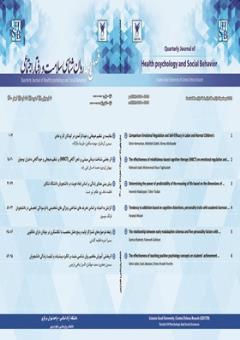-
-
List of Articles
-
Open Access Article
1 - Title Comparing the effectiveness of an intervention on healthy lifestyle and metacognitive skills training on students' intelligence beliefs
vida amirdavar Mojgan Sepahmansour -
Open Access Article
2 - The Effectiveness of Problem Solving Skills Training on Cognitive Emotion Regulation Strategies and Happiness Students
shahram vahedi amir yekanizad Somayeh Aalizadeh Nadiyeh Arjmandi -
Open Access Article
3 - Structural model of psychological distress based on insecure attachment style with the mediating role of alexithymia and moderating mindfulness and self-compassion in heart patients
Fatemeh Eslami bidgoli Mohammad Reza Tamannaeifar -
Open Access Article
4 - مقایسه اثربخشی تئاتردرمانی، موسیقیدرمانی و نقاشیدرمانی بر کارکردهای اجرایی دانشآموزان دارای اختلالات یادگیری
elnaz bahman zad Hassan khoshakhlagh Mohammad Zare Neistanak Seyed Mostafa Banitaba -
Open Access Article
5 - A comparative study of executive laws related to educational support for exceptional children and adolescents in Iran and the international organization UNICEF
Abdulrahim Tajuddin Mansure Shahriari Ahmadi Gholamali Afrooz Hasan Pasha sharifi -
Open Access Article
6 - Prediction of Happiness Based on Attachment Style and Psychological Well-being in College Students
Shima Asadian Narges Borzabadi farahani
-
The rights to this website are owned by the Raimag Press Management System.
Copyright © 2021-2025







